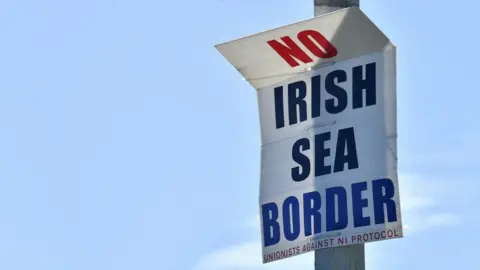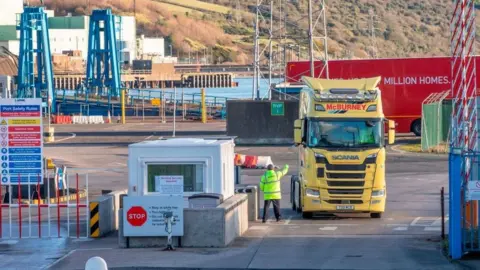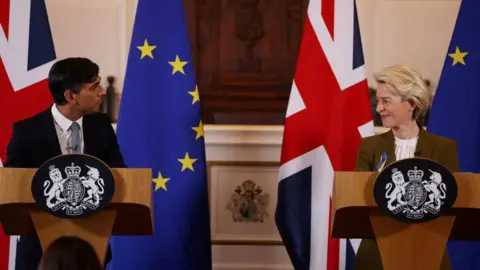Brexit: What is the new Northern Ireland trade deal?
 Reuters
ReutersThe government has set out new post-Brexit trade arrangements between Northern Ireland, the rest of the UK and the European Union (EU).
Northern Ireland's largest unionist party, the Democratic Unionist Party (DUP), refused to support earlier plans but has backed the new deal.
It clears the way for the Northern Ireland Assembly to meet again - two years after power-sharing collapsed.
Why does Northern Ireland need a Brexit deal?
Trade between Northern Ireland, the rest of the UK and the Republic of Ireland was straightforward before Brexit - all parties were in the EU and shared the same trade rules.
However, when the UK left the EU, a deal was required to allow trade to continue between Northern Ireland and the Republic of Ireland.
The EU has strict food rules, and requires border checks when certain goods - such as milk and eggs - arrive from non-EU countries like the UK. Paperwork is also required for other goods.
But the idea of checks at the Irish border is a sensitive issue because of Northern Ireland's political history.
It was feared that introducing cameras or border posts as part of checks on incoming and outgoing goods could lead to instability.
How will the new Northern Ireland trade deal work?
The new deal agreed between the UK government and the DUP - called "Safeguarding the Union" - will reduce checks and paperwork on goods going from Great Britain (England, Scotland and Wales) to Northern Ireland.
There will be no routine checks on British items being sold to consumers in Northern Ireland.
However, some British products brought in for processing, such as raw materials and components, will still face full customs processes.
DUP leader Sir Jeffrey Donaldson said the deal meets his party's objectives. He said: "We're no longer in a situation where if you bring goods in to sell in Northern Ireland, you need a customs declaration."
 Getty Images
Getty ImagesThe UK government will also introduce two pieces of legislation, to guarantee Northern Irish goods can be sold in Great Britain in all circumstances, and to confirm Northern Ireland's place in the UK.
A new body called Intertrade UK will work to boost trade between UK nations. At present, some online shoppers in Northern Ireland are told goods sold in the rest of the UK are not available for them to buy.
What are the Northern Ireland Protocol and Windsor Framework?
The first agreement with the EU, called the Northern Ireland Protocol, came into force on 1 January 2021.
That introduced new checks on goods from Great Britain, at Northern Ireland's ports.
The checks applied even if the goods were to remain in Northern Ireland.
This angered unionists and led the DUP to boycott Northern Ireland's power-sharing administration at Stormont.
 Reuters
ReutersThe protocol was amended by another agreement called the Windsor Framework, which was adopted by the UK and EU in 2023.
It created two "lanes" for goods arriving in Northern Ireland from Great Britain:
- A green lane for goods remaining in Northern Ireland
- A red lane for goods which may be sent on to the EU
Products going through the green lane do not need checks or additional paperwork. Red lane goods are still subject to checks.
A ban on certain products - like chilled sausages - entering Northern Ireland from Great Britain was removed. And Northern Ireland no longer had to follow certain EU rules, for example on VAT and alcohol duties.
The Windsor Framework also introduced a mechanism called the "Stormont brake", which would let the Northern Ireland Assembly object to new EU rules which would affect Northern Ireland's trade arrangements.
That has not been tested yet because the assembly has not sat since the agreement was made.
Despite the DUP's refusal to support the Windsor Framework, the system of green and red lines started operating on 1 October 2023.
The BBC's NI economics and business editor John Campbell says the new deal maximises the flexibility allowed under the existing Windsor Framework, without changing its fundamental elements.
